Physical Address
304 North Cardinal St.
Dorchester Center, MA 02124
Physical Address
304 North Cardinal St.
Dorchester Center, MA 02124
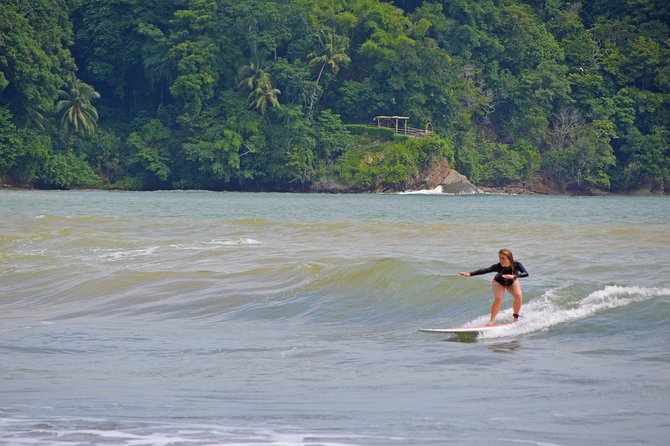
Stepping into the world of surfing can be exhilarating for a beginner. A surf lesson provides the perfect opportunity to learn the fundamentals and gain confidence in the water. From selecting the right equipment to mastering the pop-up technique, experienced instructors guide participants through each stage, ensuring a safe and rewarding experience. As newcomers catch their first waves, they’ll discover the pure joy that comes with riding the ocean’s powerful swell. The journey ahead promises an abundance of thrills and personal growth.
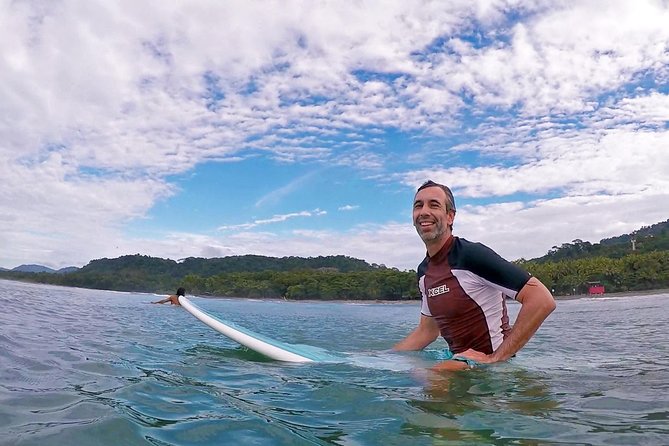
You can also read our reviews of more tours and experiences nearby.

First, you’ll want to make sure you’re prepared for your beginner surf lesson. Pack a swimsuit, towel, and sunscreen. Wear comfortable, flexible clothing that can get wet. Bring water and a light snack to refuel.
Ensure you have the included items like the surfboard, rash guard, and water. Arrive at the meeting point on time, as the lesson will start promptly.
Listen closely to the instructor’s safety tips and guidance. They’ll teach you the basics of paddling, popping up, and riding the waves.
With the right preparation, you’ll be riding waves in no time.
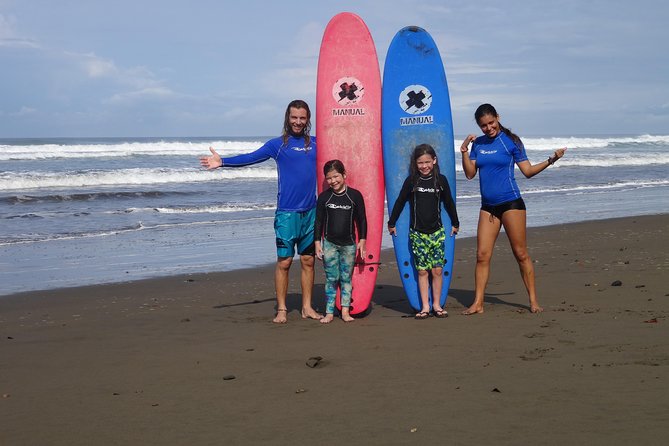
When you arrive at the meeting point of the Costa Rica Surf Camp in Playa Dominical, you’ll find it conveniently located next to the El Coco Restaurant.
The Costa Rica Surf Camp in Playa Dominical is conveniently located next to the El Coco Restaurant.
Look for the colorful surfboards and friendly staff ready to greet you. They’ll check you in and provide any additional information you may need.
If you have any questions or special requests, don’t hesitate to ask. After a brief orientation, you’ll be fitted with a rash guard and your surfboard, then head out to the beach for your lesson.
Remember to bring any personal items you’ll need, like sunscreen and a towel, and get ready for an exciting adventure.
How important is the right surfboard when taking a beginner surf lesson? It’s crucial.
Beginners need a surfboard that’s long, wide, and thick to provide stability and buoyancy. The local provider will have the appropriate boards for newbies. Typically, these are soft-top "foamies" that are easy to paddle and stand on.
The instructor will help select the right size based on the student’s height and weight. Using the correct surfboard makes it easier to catch waves and maintain balance, allowing the beginner to focus on technique rather than fighting the board.
The right board can make all the difference in a successful first surf lesson.
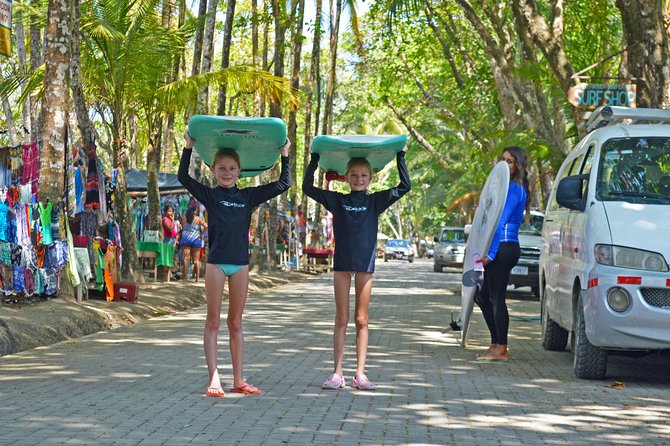
As the instructor introduces the basics of surfing, they’ll guide the beginner through the proper techniques for paddling, popping up, and riding the waves.
The instructor guides the beginner through techniques for paddling, popping up, and riding the waves as they introduce the basics of surfing.
They’ll demonstrate how to effectively paddle out and position the body on the board.
Next, they’ll teach the essential skill of popping up – quickly standing up on the board as the wave approaches.
Finally, the instructor will provide tips on reading the wave’s shape and timing the ride, helping the beginner catch and ride their first waves.
Throughout the lesson, the instructor will offer personalized feedback to ensure the beginner’s progress.
With the basics covered, the instructor guides the beginner surfer to the water’s edge. Holding the surfboard, the surfer waits for the perfect wave.
The instructor explains when to start paddling and how to pop up onto the board. As the wave approaches, the surfer begins paddling, timing their movements carefully.
With the instructor’s encouragement, the surfer rides the wave, balancing and maneuvering the board. It’s an exhilarating experience, the first taste of the surfer’s high.
The instructor watches proudly, ready to offer feedback and guidance for the next attempt. Catching the first wave is a milestone, marking the start of the surfer’s journey.
Once the exhilaration of the first wave subsides, the focus shifts to improving one’s technique. Proper body positioning, weight distribution, and smooth transitions are key.
Instructors guide students on paddle techniques, reading the waves, and timing the pop-up. Practicing turns, cutbacks, and bottom turns help develop board control.
Developing muscle memory through repetition is crucial. Patience and resilience are essential, as mastering surf skills takes time and practice.
With each wave, students gain confidence and progress their abilities. The thrill of riding bigger, faster waves motivates continued learning and refinement of technique.
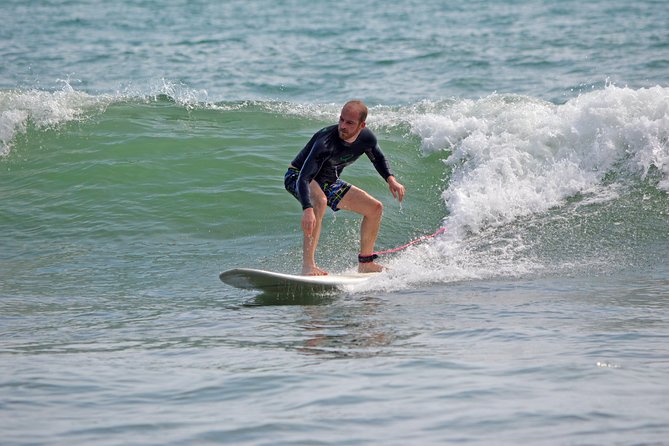
After a rigorous session honing their surf skills, students welcome the opportunity to take a break and enjoy the refreshing fruit and water provided.
The fruit, often tropical varieties like pineapple and mango, replenish energy levels and provide a sweet, juicy respite. The water helps rehydrate, preparing students for their next round of practice.
Resting on the beach, students savor the flavors and reconnect with their classmates, sharing their progress and excitement.
This break allows them to recharge both physically and mentally, ensuring they’re ready to tackle the waves with renewed vigor.
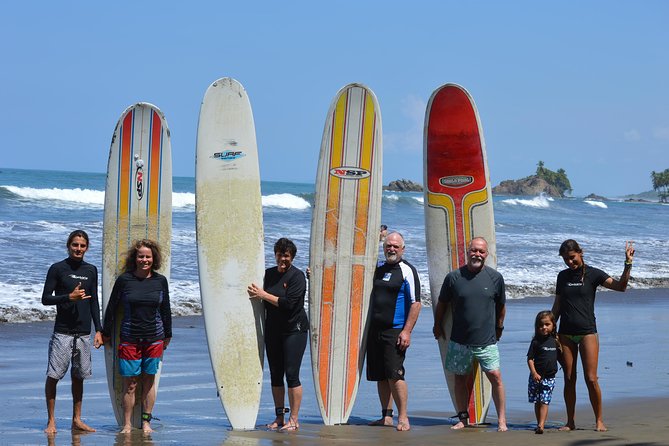
As students reflect on their surf lesson experience, they feel a profound sense of accomplishment. The initial nervousness and uncertainty gradually gave way to growing confidence as they skillfully rode the waves.
Overcoming their fears, they marveled at their own progress, from struggling to standing on the board to eventually carving smooth turns. The exhilaration of successfully navigating the ocean’s dynamic currents has left an indelible mark.
Students now understand why surfing is a beloved pastime, and many vow to continue honing their skills, eager to embark on future aquatic adventures.
We've Also reviewed these nearby tours and experiences
The cancellation policy allows for free cancellation up to 24 hours before the experience starts. Travelers can reserve the surf lesson now and pay later, making it a flexible option.
No, you can’t bring your own surfboard to the surf lesson. The lesson includes a surfboard for you to use during the session. All necessary equipment like the surfboard, wetsuit, and life vest are provided as part of the lesson.
The beginner surf lesson doesn’t have a minimum age requirement. However, the provider recommends the activity for participants aged 12 and up who can swim comfortably. Young children may need additional supervision and support during the lesson.
Yes, the provider offers discounts for group bookings. Groups of 4 or more can enjoy a 10% discount on the total price. Simply mention the group size when booking to receive the reduced rate.
Yes, you can reschedule the surf lesson if the weather is poor. The provider offers free cancellation up to 24 hours before the scheduled start time, allowing you to rebook for a better weather day.
The beginner surf lesson provides a thrilling introduction to the sport. With the guidance of experienced instructors, participants learn essential skills and techniques, building confidence as they catch their first waves. The lesson’s combination of hands-on practice and personalized feedback equips newcomers with the knowledge and excitement to continue their surfing journey. It’s an unforgettable experience that sparks a newfound passion for the ocean and the art of riding waves.